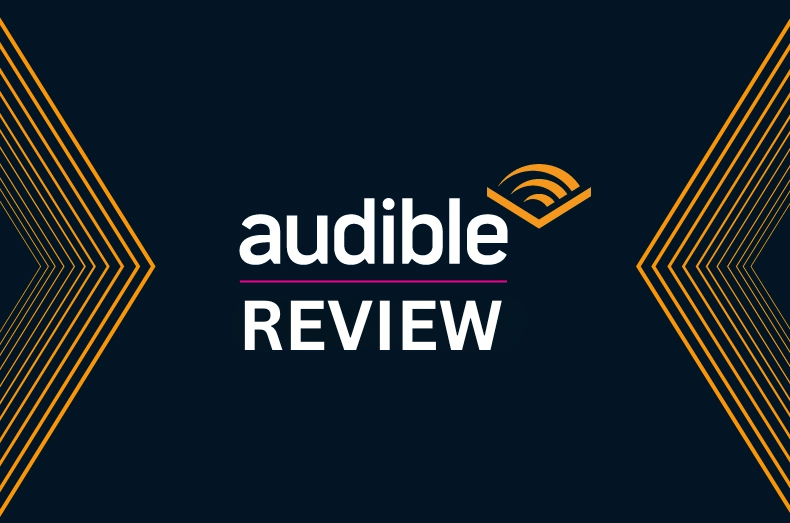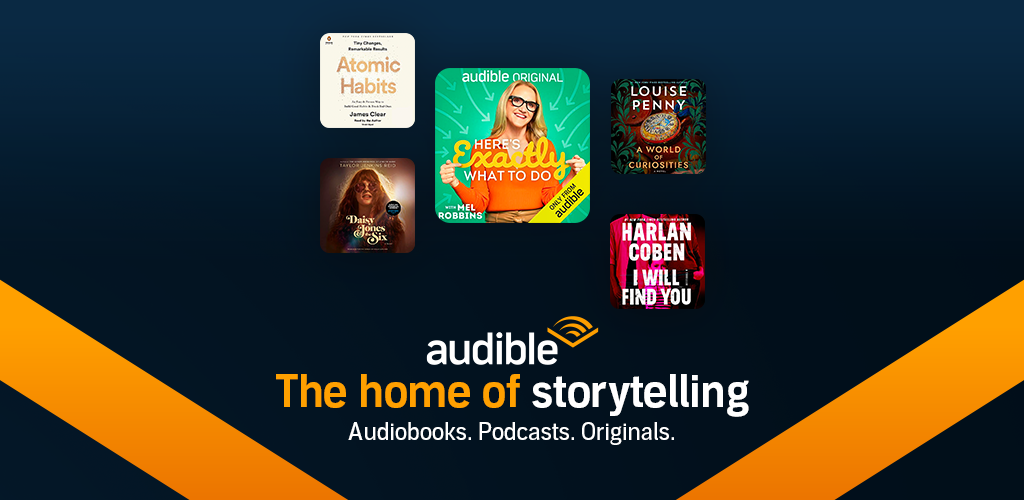Audible Review 2023 – Is Audible Worth It?
11 min read
Audiobooks provide a unique and convenient way to enjoy literature and other spoken content. As the world’s most renowned provider, Audible is the go-to choice for many audiobook listeners. But with its subscription-based model and various competitors, you may be wondering: is Audible worth it? In this comprehensive Audible review, I’ll delve into Audible’s offerings, evaluating its pros and cons, and comparing it with the competition to give you a clear idea if it’s the right choice for you.
Quick Summary of this Audible Review
Audible is a one-stop listening destination for people who love quality audio storytelling—from podcasts to audiobooks and everything in between. In my guide to the best audiobook services, I picked Audible as the best overall platform due to its massive library, integration across devices, easy return policy, and Audible Plus selection.
So, is Audible worth it? Yes, for many people it will be, but ultimately it will depend on your own personal listening habits and circumstances as there are some strong competitors with their own unique value propositions. I recommend leveraging the 30-day free trial to see if Audible’s offer works for you before making a commitment.
Understanding Audible
What is Audible?

Audible is a provider of spoken-word entertainment, offering a vast array of audiobooks, podcasts, and original content. It is a subsidiary of Amazon and boasts one of the largest and most diverse collections of audio programming across genres, languages, and authors, from best-selling novels to insightful non-fiction and engaging children’s stories.
Beyond being a platform for buying and listening to audiobooks, Audible stands out with its production of Audible Originals – exclusive titles crafted by renowned storytellers across different creative fields. Audible also differentiates itself with its integration across devices. Whether you’re listening on your phone during your morning run, on your tablet in the evening, or even on your Alexa-enabled devices, Audible keeps track of your progress. Together, these help position Audible as a leading service in the world of audio entertainment.
The Audible Story
Audible has a rich history worth taking a moment to appreciate. Here are some interesting facts about Audible:
Founded by a Writer: Audible was founded in 1995 by writer and journalist Don Katz. His goal was to disseminate more literature and information through a convenient format – audiobooks. Don remains involved with Audible as its Executive Chairman. I really enjoyed this NPR interview with Don in which he tells the story of Audible’s founding and journey to the present.
Innovation in Reading: Audible invented and commercialized the first digital audio player in 1997, four years before the introduction of the iPod. This paved the way for a new way of consuming books.
Part of the Amazon Family: Audible was purchased by Amazon in 2008 for approximately $300 million. This has led to a close integration with Amazon’s services, including the Kindle and Alexa devices.
Audible Studios: Audible has its own production arm, Audible Studios, that produces exclusive content for the platform. These productions often feature famous actors, writers, and celebrities.
Major Employer of Actors: Due to its Audible Originals and the need for audiobook narrators, Audible is considered one of the largest employers of actors in the New York City area.
Community Impact: Audible’s headquarters are in Newark, New Jersey, and it has launched various initiatives to positively impact the local community, including providing local students with paid internships, encouraging employees to live in Newark by offering housing incentives, and supporting local businesses through a lunch program.
Audible Theater: Audible Theater is an initiative that produces and promotes theatrical works for audio. This platform features full-cast audio plays, often written by award-winning playwrights or adapted from acclaimed stage plays, bringing a rich, immersive theater experience to listeners wherever they are.
How Does Audible Work?

Audible operates primarily on a membership basis, although non-members can also purchase audiobooks at regular prices. The platform offers several membership plans that cater to different user needs:
Audible Plus: provides unlimited access to the Audible Plus Catalog which includes thousands of audiobooks, podcasts, and originals.
Audible Premium Plus: plans come with all the benefits of Audible Plus, in addition to monthly or annual credits that you can use to purchase any audiobook, regardless of its price.
Buying and listening to audiobooks on Audible is easy. You can search or browse through their extensive library, purchase your preferred audiobook, and it becomes immediately available for streaming or downloading in your library. You can listen to your audiobooks on the Audible app, available on iOS, Android, Windows, and Amazon devices.
Audible Pros: The Benefits of Audible
As we continue with this Audible review, it’s time to delve into Audible’s benefits. Here are the top reasons why Audible is widely appreciated by audiobook enthusiasts:
Extensive Library: With over 600,000 titles, Audible boasts the most extensive collection of audiobooks and spoken word content available. Whether you’re looking for a new release or a classic, chances are you’ll find it on Audible.
Audible Originals: As mentioned before, Audible produces exclusive content that can’t be found anywhere else, adding unique value to the platform. Some popular exclusive titles are Born a Crime and Project Hail Mary.
High-Quality Audio: Audible ensures that all its content has top-notch audio quality. No matter what device you use, the sound is clear and crisp, enhancing the listening experience. There is even a growing selection of Audible books with Dolby Atmos which offer a spatialized, immersive experience.
User-Friendly Interface: The Audible app is intuitive and easy to navigate, with features like adjustable playback speed, bookmarks, sleep timer, and the ability to download books for offline listening.
Seamless Integration Across Devices: Audible’s app syncs across devices, so you can switch between your smartphone, tablet, or Alexa-enabled device without losing your spot.
Flexibility of Plans: Audible offers different subscription plans to cater to various types of users. You can choose from a range of options depending on your listening habits.
Easy Returns: If you’re unsatisfied with an audiobook, Audible’s return policy allows you to return it within 365 days of purchase and get your credit back.
Keep Your Books Forever: Even if you cancel your membership, any books you’ve purchased with your credits are yours to keep and can be listened to at any time.
Additional Membership Benefits: These include deals like the Daily Deal, where a popular title is discounted significantly, and sales exclusive to members.
Languages / Countries: Audible operates a number of websites, each of which target a different customer population defined by language preference or geographical location. Some of these include Audible.ca for Canada and Audible.co.uk for the UK and Ireland.
While this list of benefits makes a strong case for Audible, no platform is without its drawbacks. In the next section of my Audible review, I’ll dive into the negatives of Audible to further help us understand if Audible is worth it.
Audible Cons: Drawbacks of Audible
Let’s consider some of the potential disadvantages of Audible:
Cost of Membership: The cost of an Audible subscription can be a deterrent for some. If you’re not an avid listener, the monthly fee might seem steep, especially considering there are cheaper or free audiobook services available.
Credits Expire: Audible credits expire one year after they were purchased. So if you’re not consistently using your credits, you could lose them.
Not All Books Are Available: Despite Audible’s extensive library, some books, especially region-specific ones, may not be available due to copyright restrictions.
Navigating the App Can Be Confusing: Some users have found the Audible app difficult to navigate initially, although most get used to it over time.
Complexity of Plans: Audible’s various plans and their differing benefits can be confusing. Understanding the difference between Audible Plus, Premium Plus, and all the other options takes time and effort.
DRM. Audible employs DRM protection for its audiobooks. This means that when you make a purchase, you are buying a license to listen to the book, and this license comes with restrictions. For example, you can only play your Audible books using authorized apps or devices. While DRM is intended to prevent piracy, it can limit your freedom to transfer or convert purchased audiobooks.
Amazon Business Practices. Since Audible is owned by Amazon, concerns about Amazon’s business practices inevitably affect perceptions of Audible. Criticisms of Amazon range from its handling of workers’ rights to its competitive practices. Some users might choose to avoid Audible due to these concerns, despite the platform’s own merits.
Each of these points may affect the value you get from an Audible membership. In the next part of this Audible review, I’ll compare Audible with other popular audiobook platforms.
Audible vs. The Competition
Now, let’s compare Audible with other popular audiobook services to give us more perspective in understanding if Audible is worth the investment.
Audible vs. Scribd: Unlike Audible’s credit system, Scribd offers a “Netflix for books” experience for a flat monthly fee that some people prefer. However, Scribd’s library is not as extensive as Audible’s. Audible also excels in exclusive content with Audible Originals, and the fact that you can keep your books even if you cancel your membership.
Audible vs. Libby: Libby, powered by OverDrive, allows you to borrow audiobooks for free through your local library. The availability of titles can be hit or miss, depending on your library’s collection. Furthermore, you might have to wait for popular titles. With Audible, once you purchase an audiobook, it’s yours to listen to immediately and forever.
Audible vs. Apple/ Google/ Chirp: These platforms let you buy audiobooks individually without a subscription, which can be an advantage for infrequent listeners. However, for regular listeners, this will likely end up being more expensive than Audible’s subscription.
Audible vs. Audiobooks.com: Audiobooks.com has a credit system that is very similar to Audible. However, Audible’s library is larger, and it also offers Audible Originals, which Audiobooks.com lacks.
Audible vs. Libro.fm: Libro.fm has a credit system and a smaller catalog but sells DRM-free audiobooks and allows you to support independent bookstores.
As you can see, the competition in the audiobook market is stiff and there are some good alternatives to Audible. While each platform has its unique advantages, Audible still stands out due to its vast library, exclusive content, and device compatibility. But do these features provide enough value to justify its cost and make Audible worth it? These are the questions I’ll explore in the next section of this Audible review.
Is Audible Worth It?

One of the biggest factors when considering any subscription service is cost. At first glance, Audible’s price can seem high compared to other entertainment subscriptions. But is Audible worth it when you delve deeper into the value it provides? Let’s take a look.
For the cost of an Audible Premium membership, you receive one or two credits per month (USD $14.95/month for 1 credit or $22.95/month for 2 credits). Each credit can be exchanged for any audiobook in Audible’s massive library, regardless of its standalone price.
Additionally, membership offers access to the Audible Plus catalog, including thousands of audiobooks, podcasts, and Audible Originals, all available for unlimited listening. Then there are the member-only sales and discounts, providing further opportunities to expand your audio library.
The value becomes particularly apparent when you consider the quality and convenience Audible offers. High-quality audio, the ability to switch seamlessly between devices, narration speed control, sleep timers, and a user-friendly interface all contribute to an enhanced listening experience.
However, the value of Audible depends heavily on your listening habits. If you are an audiobook enthusiast like me, the service offers undeniable value. The cost of a single credit is often less than the price of a standalone audiobook, especially for newer or popular titles.
On the other hand, for those who only listen to an audiobook occasionally, a pay-per-book service like Chirp Books or a free service like Libby might be more cost-effective.
There is also the option of the Audible Plus-only membership at $7.95/month. While there is certainly a healthy catalog of good Audible Plus books, most listeners will want to choose a title from Audible’s premium selections.
So, is Audible worth it? It ultimately comes down to your personal needs and consumption habits. In the next part of our Audible review, we’ll look at who Audible is best suited for.
Who Is Audible Best Suited For?
After exploring the pros, cons, and comparing Audible with its competitors, it’s clear that whether or not Audible is worth it depends largely on individual preferences and habits. Here’s a breakdown of who might get the most value from an Audible subscription:
Avid Audiobook Listeners: If you go through multiple audiobooks each month, Audible’s credit system can offer you significant savings, especially on new releases and bestsellers.
Fans of Exclusive Content: If you love getting access to unique content, the Audible Originals that come with membership could be a significant draw.
Commuters and Multi-taskers: If you spend a lot of time commuting, working out, doing chores, or any activity where you can listen to something, an Audible subscription can be a great way to make that time more enjoyable and productive.
Amazon Ecosystem Users: If you’re heavily invested in the Amazon ecosystem (Kindle, Alexa, etc.), Audible’s integration with these devices makes it a seamless addition to your digital life.
Learning Enthusiasts: If you love learning and expanding your horizons, Audible’s library includes language learning courses, lectures, and non-fiction books across a wide range of topics.
However, Audible might not be the best choice for everyone. Infrequent listeners, those on a tight budget, or those with access to a well-stocked local library service may find more value in other audiobook services.
The bottom line? Audible’s extensive library, exclusive content, and high-quality production make it a great choice for those who frequently listen to audiobooks and value convenience and quality. However, less frequent listeners might find it more cost-effective to explore other options.
Stay tuned for the final part of my Audible review, where I’ll sum up our findings and offer a final verdict on whether Audible is worth it.
Wrapping Up Our Audible Review
Audible’s vast library, high-quality audio, exclusive content, and seamless cross-device integration make it a standout choice in the audiobook market.
With its subscription-based model, Audible offers a convenient way to enjoy a broad range of titles for a fixed monthly price. The added benefit of member-exclusive sales and discounts only sweetens the deal. And the ability to exchange books you don’t like reduces the risk of trying out new authors or genres (note: it’s important not to abuse this Audible return policy as it does impact authors and narrators).
However, whether Audible is worth it for you depends largely on your personal listening habits. If you’re an avid audiobook listener or someone who spends a lot of time commuting or multitasking, the value proposition is strong. For less frequent listeners, or those with access to a robust local library, alternatives may provide a more cost-effective solution.
So, is Audible worth it? It certainly can be, depending on your individual needs and circumstances. I recommend leveraging the 30-day Audible trial to see if the service aligns with your lifestyle and listening habits before making a commitment.



